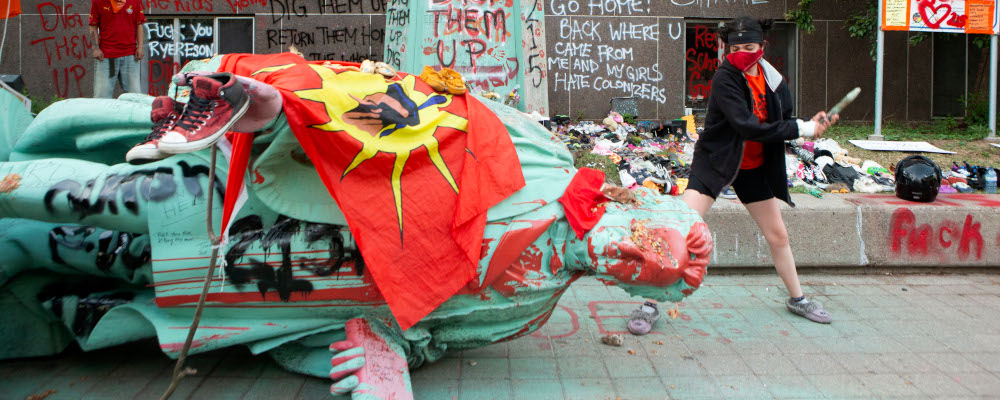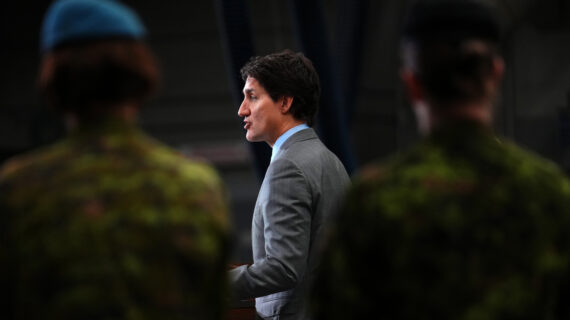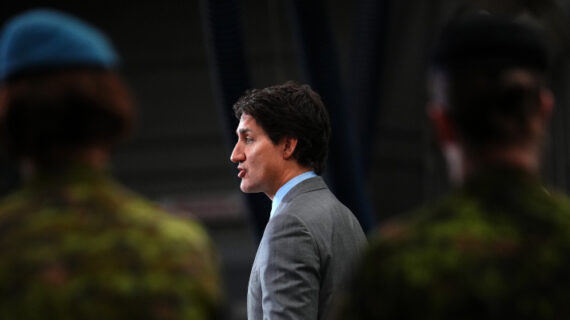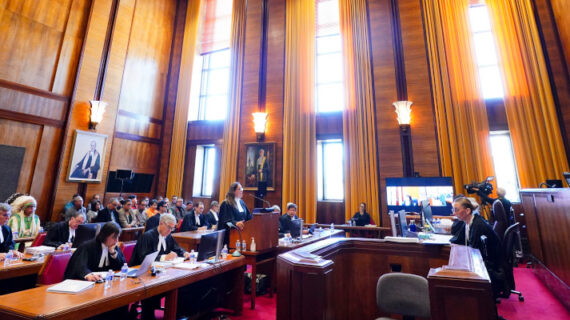Twenty-five years after the appearance of J.L. Granatstein’s Who Killed Canadian History? the national bestseller produced by our “national coroner” has proven to be prophetic. Its author, in his prime, was a towering giant in a field mostly populated by relatively modest, fastidious, and heads-down academics toiling in the archives and writing for rather small, specialized, and rarified audiences. Critics lay in wait but lost the battle to capture public opinion.
Granatstein’s 1998 cri de coeur was a major catalyst for the history education revival movement of the late 1990s and early 2000s. While it was initially sparked by Keith Spicer’s 1991 dire report, “Citizen’s Forum on Canada’s Future”, the “little red book” on the sorry state of Canada’s history connected with public-spirited philanthropists and a far broader popular audience. Its author’s status as Canada’s pre-eminent history professor in the Anglosphere gave it instant credibility, especially among policy-makers, many of whom were familiar with a few of his 50-odd published books.
Granatstein’s credibility and influence
Historians with a public audience, much like public intellectuals, then as now, are viewed with suspicion in academe. What’s most unusual about Granatstein is that he broke all the rules—setting impossibly high standards, bringing incredible passion and an edge to his teaching, throwing himself into urban reform politics, and, yes, alienating academic colleagues with all that productivity.
Many of Granatstein’s former students, like me, were completely awestruck, initially fearful, and forever influenced by his teaching, scholarship, and writing. My first encounter with him was as a York University history undergraduate in 1971-72 enrolled in his infamous and downright scary Senior Seminar class on “Modern History of Canadian Political Parties.” Twelve students appeared for that first class and Granatstein quipped—“I’ll see half of you next week.”
Recently arrived at York, our youngish and intellectually alive history professor may have been out to prove himself. Why else would he assign each of us to give a two-hour long seminar based upon our own 50-page original research papers with 30 to 50 footnotes, individually typed on legal-sized paper, and distributed, in advance, to everyone in the class? Six of us stayed the course and I remember every one of them to this day.
Many university professors focus on their own research and are, often, casual, ineffectual, or perfunctory instructors. As a young professor, Granatstein was an outstanding teacher. In one memorable class on the pivotal Canadian General Election of 1911, he presented us with a single document—the “Manifesto of the Toronto 18”—and presented a virtual clinic on how to analyze a text, place it in context, extrapolate key passages, weigh its significance, and then debate whether it deserved the public attention it received at the time.
Origins of the Canadian history revival movement
Granatstein’s boldly provocative book did not emerge out of nowhere. Growing concerns over regional divisions in the late 1980s were diagnosed by Spicer as symptomatic of a “national malaise.” The rise of René Lévesque and the Parti Québécois to power and the ever-present threat of what were termed Quebec’s “Never-endums” should not be underestimated because our political class was on edge and most saw our national future hanging in the balance. It all gave rise to a vigorous public debate over the role of history and civic education in fostering and sustaining a sense of shared community.
The dissolution of the national narrative of “unity in diversity” was lamented by Michael Bliss in his controversial Donald Creighton Centennial Lecture, entitled “Privatizing the Mind: The Sundering of Canadian History, the Sundering of Canada” and delivered on the eve of the 1991 federal referendum. According to Bliss, historians had dedicated themselves to exploring the “limited identities” of region, class, gender, and ethnicity and were, therefore, party to the gradual fragmenting of any collective sense of national community.
Granatstein’s book gave forceful expression to a national perspective which was labelled by critics as the Toronto school of historical thinking. Historians of the 1970s and 1980s, he wrote in his most incendiary passage, were essentially fiddling while Rome was burning. With characteristic bluntness, he charged that a new generation of “social historians” had abandoned the pursuit of a unifying national narrative and spent most of their time researching and teaching students about “pork-packing, Marxist labour organizers, prisons and insane asylums, parish politics,” and what he derisively described as “the history of housemaid’s knee in Belleville in the 1890s.” “Really,” he added, “Who cares?”1p. 79
The Dominion Institute, founded in 1997 by Rudyard Griffiths and a small group of recent university graduates, played a role in preparing the ground. Awakened by Spicer’s report and Bliss’s early warnings, the Dominion Institute began producing national surveys raising serious questions about the state of public knowledge about past politics, wars, and civics. Amid these rumblings, Granatstein’s book exploded like a Molotov cocktail, reinforcing the message and identifying the alleged perpetrators, most notably the “new” social historians, ministries of education, faculties of education, and curriculum writers.
Saving Canadian history emerged as a cause celebre. The Historica Foundation, co-founded in October 1999 by Charles Bronfman and BCE’s Lynton R. (Red) Wilson, emerged to fund greatly expanded resource programs, including the Heritage Minutes, Heritage Fairs, and the Canadian Encyclopedia Online. Responding to the public mood, CBC-TV and Radio Canada poured millions into Mark Starowitz’s epic (2000-2001) Canada: A Peoples’ History series.
With generous funding from federal Liberal governments, the Ontario government, and the corporate sector, three different organizations entered the field: the Historica Foundation, the Dominion Institute, and Canada’s National History Society (CNHS), based in Winnipeg and the publishers of The Beaver, now Canada’s History. The McGill Centre for the Study of Canada, headed by Desmond Morton, utilized conferences to strengthen the network. A Governor General’s Award for Teaching Excellence, founded in 1996 and sponsored by CNHS, recognized a dozen or so exemplary teachers each year.
Each of the three national history advocacy groups offered its own programs to ensure that “more history was taught better” in the schools. From 1998 to 2003, a Canadian history consortium, led by Historica and later the Association for Canadian Studies, sponsored a Biennial National History Teaching Conference and, from 2001 to 2003, a Montreal-based national Summer Institute for Teaching Excellence in Canadian History. All this activity managed to energize Canadian history enthusiasts, but it ran foursquare into provincial school systems where the subject discipline continued to occupy a diminishing place with limited course offerings.
The initial wave of Canadian history initiatives was gradually superseded by a new movement championing “historical thinking”, spearheaded by Peter Seixas and Penney Clark at UBC. Backed by Seixas’s UBC Centre for Historical Consciousness and heavily influenced by the work of Sam Wineburg, a new model for teaching “historical thinking” was actively promoted, leading eventually to Benchmarks of Historical Thinking. By then Canadian history advocates had discovered the World Wide Web and its enormous potential for engaging students in the study of historical issues and problems.
Such discoveries gave rise in the first decade of the new century to a website series known as Great Unsolved Mysteries in Canadian History and another venture in history education networking, The History Education Network/Histoire et Education en Réseau (THEN/HiER). Like its predecessors, THEN/HiER aspired to lofty goals. The new network, Joe Schlesinger reported in the March 2010 issue of Teaching Canada’s History, set out to build a community from elementary schools to universities, attempting to bridge “the disconnect between the ivory towers of academia and the classroom.”
The high point of history revivalism
The Dominion Institute conducted a national study of the Canadian high school history curriculum during the 2008-09 school year. That first Canadian History Report Card, commissioned by Mark Chalifoux of the Institute and written by Bishop Strachan School history teacher J.D.M. Stewart, provided a detailed analysis of the official curriculum in each province and territory. In spite of all the advocacy, curriculum remained ossified and it was difficult to determine whether it penetrated the system and reached classroom teachers.
The first Canadian History Report Card revealed that “history” was still imperiled and losing ground, even in the more holistic social studies curriculum. Quebec ranked first with a B+, scoring 42 out of 50 points (84 percent), largely on the strength of requiring two full years of Quebec-Canada historical study before Grade 11 graduation. Only four provinces required students to take a Canadian history course before graduating, Quebec, Ontario, Manitoba, and Nova Scotia, and they were not only singled out but fared better than the others. Benchmarked against the Ontario model of self-standing history courses, most provinces were found wanting in terms of providing all students with exposure to at least one Canadian history course before graduation.
“Granatstein’s worst fears have been realized.”
“Provincial ministries of education,” the Dominion Institute claimed, “must be held responsible for what they ask—or do not ask—their teachers to teach their students. It is clear from this curriculum analysis that high school students in Canada are not required to learn enough about their country’s past.” Critics of the Dominion Institute’s annual Canadian History Quiz may have quibbled about its focus on the mastery of discrete facts, but that 2009 curriculum analysis demonstrated that the subject continued to be marginalized in Canadian high schools.
While subsequent Canadian History Report Cards conducted by Historica (2016 and 2021) focused more on diversity in the history curriculum, they provided further evidence of its shrinking footprint.
The ‘historical thinking’ turn
The Canadian “History Wars” subsided from 2010 onward and, buoyed by federal heritage funding, a Canadian History cottage industry emerged with conferences, teachers’ guides, and classroom-ready resources. While many of the historians were still fighting old battles (albeit mostly in the faculty lounge), history and social studies educators loosely coordinated by Peter Seixas and his UBC Centre for the Study of Historical Consciousness came to the fore. Popular magazines like Canada’s History found a place in high school classrooms and led the way in making history accessible to enthusiasts of all ages. Many secondary school practitioners, and a growing number of their university confreres, expressed the hope that the teaching of history was on the rebound.
The History Education Network, spearheaded by Penny Clarke and the UBC Educational Studies Department succeeded in promoting a “coherent conceptual framework” widely adopted in the faculties of education. Some like University of Toronto history education professor Ruth Sandwell and UBC “Historical Thinking (HT)” proponent Seixas chastised their academic colleagues for practicing teaching methods at odds with best practices in inquiry-based historical research. Rethinking Canadian history for the 21st century came to mean asking penetrating questions and seeking inventive ways of recapturing the reading public and reconnecting with those oft-forgotten high school history teachers. It also led, under Seixas’s successors, to a mutation embracing “social justice” issues to the exclusion of others, expanding the HT model beyond its discipline-specific foundations.
A new generation of history professors, epitomized by Trent University historian Christopher Dummit, began to pose a few thought-provoking questions. Where were the new syntheses to replace the all-but discredited “noble dream” narrative of Canada’s history? Now that the “new social history” and “inclusiveness” reigned triumphant, what came next? And, while professing a new openness, how had academic historians come to be talking in a largely inaccessible language and mostly to each other? At some risk to their professional reputation, Dummitt and his band of allies openly challenged the limitations of the new orthodoxy. Emboldened by the 2009 book Contesting Clio’s Craft, a few brave souls were even musing about whether the old “master narrative” was actually better than “no narrative at all.”
Much of the promise generated by the History Revival movement evaporated over the past decade or so. In spite of heroic efforts to reverse the decline, Granatstein’s worst fears have been realized. Our universities and colleges are in the grip of all-inclusive yet exclusionist ideology eating away at what remains of liberal education and dismissive of calls for academic freedom and viewpoint diversity on campus. Symbols and names associated with “settler-colonialism,” including founding Prime Minister John A. Macdonald and Canadian public education architect Egerton Ryerson, were identified, erased, or banished from the public square. The prevailing orthodoxy on campus hardened. It was safer to remain silent.
Historical amnesia has taken hold and the erosion of historical knowledge and thinking skills are readily apparent. Large segments of our population and a whole generation of recent graduates provide daily examples of empty debates over removing public statues, constitutional monarchy, universal public health care, the federal principle of equalization, and, since October 7, 2023, the continuing relevance of the Holocaust and prospects for a “two-state solution.”

Confronting a historyless future
History is now being drained out of popular culture and replaced with a contemporary mantra attuned to any possible signs of “settler-colonialism” and embracing “cancel culture.” Liberal education and its core values, including cultural diversity/pluralism, bilingualism, and accommodating differences, are all being slowly eroded by a new orthodoxy subsumed by identity politics, aptly termed “identitarianism,” and enveloping the Left as well as the Right on the political spectrum.
The so-called “Laurentian Consensus” is in eclipse, as Canadian journalist John Ibbitson has duly noted, and something different is emerging in its place. A rootless, post-national culture is one where historical tradition is obliterated, leaving us inhabiting identity-defined communities and virtually incapable of finding nuance in any public debate. Forsaking our shared and contested past is beginning to cost us dearly and essentially ‘dumbing down’ public discourse. Reacting to one crisis after another without any real compass, moral or otherwise—across a whole range of issues, from public commemoration and reconciliation to foreign policy stances—provides daily instances of collective amnesia testifying to the prevalence of the “identitarian mindset” and a narrowed and more binary vision of historical consciousness.
The shriveling of history is a symptom of our current national malaise, perhaps more dangerous than the one confronted by Granatstein twenty-five years ago. Historical awareness is essential to the health of democracy and democratic participation at all levels. Founder of the Literary Review of Canada, Patrice Dutil, pointed this out in a recent review essay. The withering of historical mindedness does undermine our ability to seriously discuss, to thoughtfully debate, and to understand (in any depth) the underpinnings of contemporary issues. Without such skills and knowledge, democracy as we know it may be doomed. It’s time to turn back the tide.




